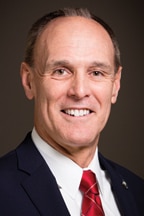 West Virginia still ranks 43rd in the nation for having the worst broadband availability, despite claims from providers like Frontier Communications that rural broadband expansion has been ongoing and have cost the company tens of millions of dollars.
West Virginia still ranks 43rd in the nation for having the worst broadband availability, despite claims from providers like Frontier Communications that rural broadband expansion has been ongoing and have cost the company tens of millions of dollars.
The state’s two senators are working to get more attention on broadband issues in one of the country’s most rural and mountainous states, despite the fact the free market is not likely to solve West Virginia’s broadband woes.
“Broadband high-speed is tremendously needed,” said Senator Joe Manchin (D-W.V.). “We have over 18 to 20 percent of West Virginians not connected whatsoever.”
“I’m working everyday on this in a bipartisan way,” said Senator Shelley Moore Capito (R-W.V.). “It’s essential for our economy, our health care, our education. All of the things that are in a new economy.”
The federal government has distributed broadband grant funds to help address rural broadband unavailability, but after a decade of assistance, rural residents often remain without service. Charlie Dennie believes taking charge of broadband issues on the local level is the only way broadband problems will finally be resolved. Dennie is a big believer in public broadband co-ops, where local communities manage their own internet access affairs without waiting around for big phone and cable companies or the federal government. Dennie runs a business in the state that depends on broadband, and if he waited for incumbent providers like Frontier to deliver 21st century broadband service, his business is likely to go out of business.
That prompted him to write this commentary:

Dennie
Much of West Virginia is a broadband desert, and we have been foolishly pleading with the major carriers for water.
Recently, we seem to be coming to terms with reality. The reality is, they’re not coming, broadband is not a utility. The international, modern-day, robber barons dominating internet delivery have no obligation or incentive to meet our needs. Their aggressive return on investment models can’t be met in the small markets. Still, they attempt to roadblock appropriately scaled providers from entering the market and meeting our needs.
Since internet and cable TV are not utilities, the carriers are free to pick the low hanging fruit of our more densely populated communities and move on, leaving smaller markets stranded on the wrong side of the digital divide. The major carriers’ only obligations or concerns are with Wall Street. Main Street and all that term implies is not a consideration.
If we’re going to see our desert watered and blooming, we’ll be digging our own wells, meaning, building our own networks. The incumbent telephone companies and the cable TV providers bristle at this idea. The major providers spent over $66 million last year to lobby the states and Congress. Twenty-one states have now roadblocked or outlawed municipal or community-owned fiber. Municipal or community owned fiber is a serious threat to the status quo.
In years past, no one would have been surprised if West Virginia lawmakers had sat on their hands and done nothing or, enacted more protectionist legislation. That didn’t happen with this Legislature. Paraphrasing Bob Dylan, “The times they are a-changing.”
During the 2017 legislative session, I witnessed the boldest and most fearless leadership in my memory. The House of Delegates Judiciary Committee led by its chairman, Del. John Shott (R-Mercer), and Vice-Chairman, Del. Roger Hanshaw (R-Clay), introduced HB-3093. It was a sweeping piece of legislation sending a strong message to the incumbent internet providers to provide better service or make room for someone who will.

Carmichael
HB-3093 created the West Virginia Broadband Enhancement Council, streamlined the process for attaching fiber to utility poles, cleared the way for new construction methods, authorized the West Virginia Economic Development Authority to make loan guarantees for broadband construction and authorized the creation of cooperative associations for internet. As a proponent of the legislation, I requested a public hearing. Gathering in the House chamber only hours before the vote, industry lobbyists voiced strenuous objections. The strongest objections to the bill were the provisions streamlining attachments to utility poles and authorizing cooperative associations to provide broadband.
HB-3093 passed the house with 97 votes. I spoke to Senate President Mitch Carmichael (R-Jackson), just before the bill was introduced in the Senate. Sen. Carmichael had the power to keep the bill from advancing and Frontier, his employer at the time, was out in force to stop it. Before the bill went to the floor Sen. Carmichael said to me, “They’ll fire me, but I have to do what I think is right.” HB-3093 passed the Senate with Sen. Mike Romano (D-Harrison), casting the single, dissenting vote. A few days later, Frontier Communications fired Sen. Carmichael. Today, there are some who want to “Ditch Mitch,” but I will always remember the day he was called to choose between his economic self-interest and what was best for his constituency. Mitch fell on his sword. He did what he thought was right.
It’s important to know where you have been to understand where you are going, and this is only a chapter of our emerging broadband story. Changing the rules that protect the powerful to move us forward requires courageous leadership. If you believe broadband isn’t a political issue, I can give you 66 million reasons why you couldn’t be more wrong.
Ironically, community owned networks will be good for the current providers. The community owned networks provide the “last mile” to the home or business that enables delivery of high-speed internet. The community networks still need the content provided by current carriers. The communities will have choices and can negotiate with providers. Everybody wins.
I’ll have more for you later. Meanwhile, visit the broadband council at https://broadband.wv.gov. Take the speed test, then look under the “Resources Tab” about co-ops. Ignore the naysayers. I’ll show you how co-ops will change everything.


 Subscribe
Subscribe
Carmichael was fired, but Frontier hired several months later.